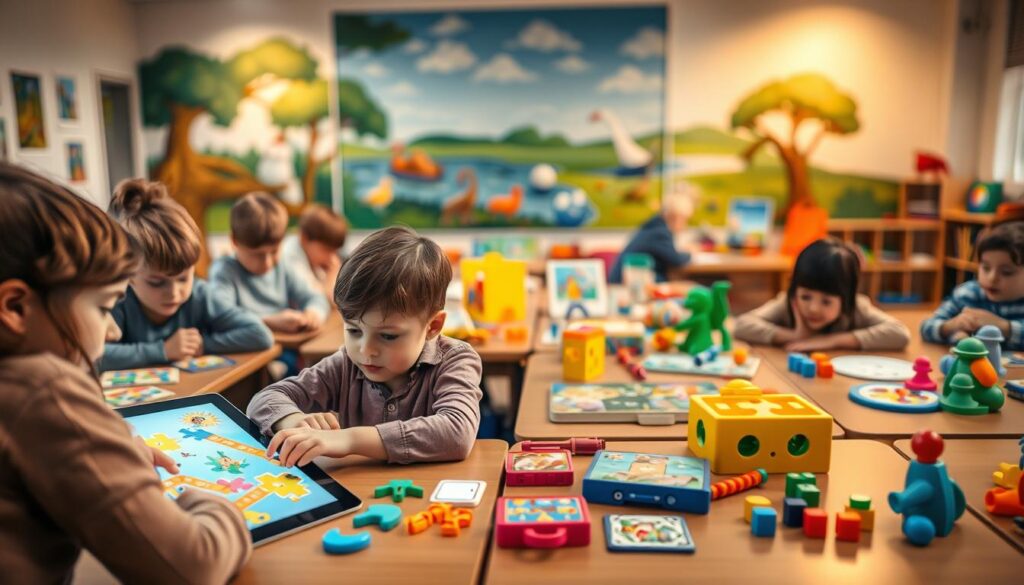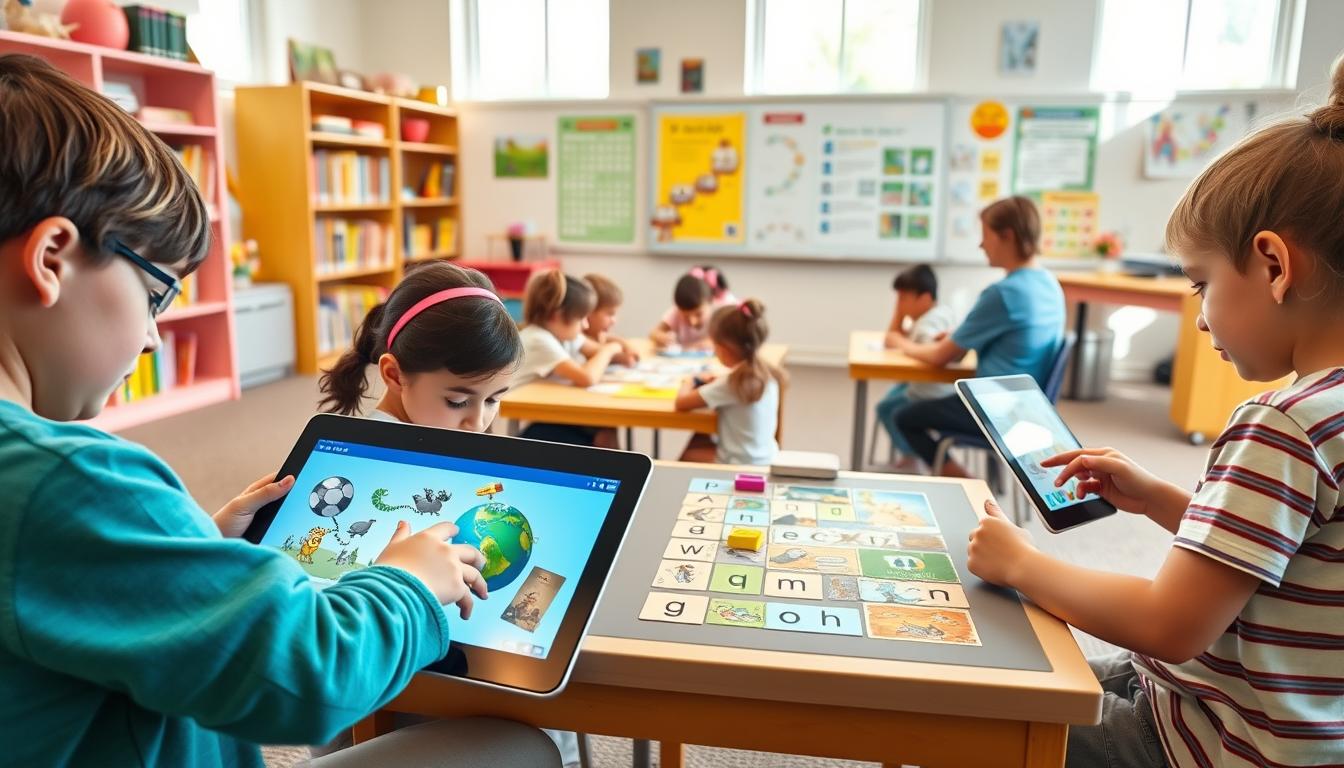Educational games that reinforce comprehension after reading sessions
Have you ever wondered if just reading is enough to really help a child understand a story? Reading is key, but adding educational games to what kids do after reading can make a big difference. These games make learning fun and help kids think critically and remember better.
As parents and teachers look for ways to improve reading skills, it’s important to know about different educational games. These games can make reading a fun and rewarding experience for kids.
Understanding the Importance of Reading Comprehension
Reading comprehension is key in literacy development. It’s more than just reading words. It’s about understanding and connecting with what we read. This skill is vital for learning in school.
It helps students do well in many subjects. They can use what they learn in different ways. This makes learning more meaningful.
Studies show that many students are struggling with reading. This makes teaching methods very important. When kids get better at reading, they also become more empathetic and aware of different cultures.
These skills help them deal with life’s challenges. They also make school a better place for them.

Games and Their Role in Education
Games are changing how we learn today. They make learning fun and easy to understand. Kids love playing games, so it makes learning exciting.
Teachers use games to get students involved in their studies. This way, students don’t just sit and listen. They learn by doing and solving problems together.
Games help kids practice important skills like speaking and writing. They make learning fun and help kids understand better. This way, learning becomes something kids look forward to.

Types of Educational Games for Children
Educational games are key in making learning fun for kids. They are made for classroom use and focus on interactive learning. These games help kids learn and understand better, making education enjoyable.
Games like scavenger hunts, BINGO, and word association activities are popular. They encourage kids to work together and compete. This helps them learn important language arts concepts.
Games that help with comprehension, like story sequencing and dialogue role-playing, are also great. They help kids understand stories better. These activities make learning stick in their minds as they actively take part.
| Game Type | Description | Learning Focus |
|---|---|---|
| Scavenger Hunts | Interactive explorations where children find items related to a lesson. | Engagement with material and practical applications. |
| BINGO | Traditional game format adapted for vocabulary reinforcement. | Recognition of synonyms and antonyms. |
| Word Associations | Players connect words based on meanings or themes. | Enhancing vocabulary and comprehension skills. |
| Story Sequencing | Children organize events of a story in the correct order. | Understanding narrative structure and flow. |
| Dialogue Role-Playing | Students act out conversations and scenarios from texts. | Improving comprehension and critical thinking. |
Choosing the right educational games can really boost a child’s learning. They mix fun with learning, helping kids grow academically in a fun way.
Brain Games for Post-Reading Retention
Brain games are key tools to boost cognitive skills and keep information in mind after reading. They make learning fun and interactive. Kids learn to solve problems and connect what they read to real life.
What Are Brain Games?
Brain games are fun activities that help improve thinking skills. They mix challenge and strategy, appealing to kids of all ages. By playing, kids get better at thinking quickly and learn new things.
Benefits of Brain Games for Learning
Brain games offer many learning benefits. They help improve:
- Memory retention during and after reading
- Critical thinking and analytical skills
- Vocabulary through gameplay
- Student engagement in learning
Playing brain games makes learning fun and builds confidence. It turns learning into a game, making it exciting. Teachers can check how well students understand and adjust their teaching as needed.
Interactive Storytelling Activities
Interactive storytelling activities grab students’ attention and spark their creativity. They get to dive into stories in a fun way. By acting out roles or using puppets, kids learn about stories and characters.
These activities are more than just games. They help kids understand and remember stories better. Schools and parents can use them to make reading more exciting. When kids actively participate in stories, they start to love reading more.
Creative Writing Games to Enhance Comprehension
Creative writing games are fun ways for kids to get better at understanding what they read. They help kids build stories using random prompts, which boosts their creativity. This also helps them use what they know about stories in a real way.
These games let kids express themselves and explore different characters and places. They make learning vocabulary and grammar fun. By adding creative games to reading time, kids get a better grasp of reading and writing together.
Visual Aids and Graphic Organizers
Visual aids and graphic organizers are key tools in education. They make learning easier for students by breaking down complex ideas into simple visuals. For instance, story maps show how stories are structured, and flow charts outline processes and connections.
Adding graphic organizers to lesson plans boosts learning. Students can organize and summarize important points from their reading. Tools like Venn diagrams help them compare and contrast ideas. This visual approach helps students understand and apply what they’ve learned.
Using these methods gets students actively involved in their learning. They can better understand tough topics through visual aids. This makes learning stick longer. Visual aids and graphic organizers are essential for improving reading skills and academic success.
Games that Boost Vocabulary Skills
Vocabulary games are key to improving kids’ language skills. They make learning fun and interactive. Games like synonym BINGO help kids understand words better by making them think about word connections.
Word scavenger hunts are a fun way to find vocabulary in everyday life. Kids learn by searching for words, which helps them remember and understand better. These games turn learning into a fun adventure that keeps kids engaged.
Playing these games helps kids grow their vocabulary and get better at reading and speaking. These games make learning words fun and help kids connect with language on a deeper level.
Engaging Activities for Discussing Stories
Classroom discussions can make learning more fun and meaningful. By doing activities that help students analyze stories, they learn more about characters and themes. These talks are great for teamwork, letting everyone share their views on what they’ve read.
Open-Ended Questions for Classroom Discussion
Open-ended questions make discussions better. They help students think deeply and share their thoughts on what they’ve read. Here are some good ones:
- What motivated the main character’s actions in the story?
- How does the setting influence the plot development?
- What theme do you feel resonates most with today’s world? Why?
- How would you alter the ending of the story and what impact would that have on the overall message?
These questions help students understand stories better and share their ideas. It’s good for learning and helps improve speaking skills.
Utilizing Technology for Enhanced Learning
Technology in education changes how we learn, making reading fun and interactive. Reading apps and games help students understand texts better. They make learning exciting and engaging.
These tools adjust to each student’s level, offering personalized learning. Kids get to see and interact with materials that keep them interested. This makes learning a fun experience.
Interactive reading platforms have quizzes and feedback to help students learn. They make learning a hands-on experience. This leads to better retention and understanding of what they read.
Parent-Child Reading Activities to Reinforce Skills
Parent-child activities are key in boosting literacy skills at home. Reading together helps kids connect with stories and understand them better. Parents’ conversations about the stories create a loving space for reading.
Playing out favorite characters or talking about different story endings makes reading fun. These moments strengthen family bonds and boost kids’ confidence in reading. It helps them grasp texts better.
Doing different activities together not only improves reading skills but also sparks a love for learning. These experiences make reading a joy that kids will keep with them as they grow.
Conclusion
Educational games and fun activities are key to improving reading skills in kids. They make learning fun and encourage kids to get involved. This helps them understand things better.
Using games, creativity, and technology together is very important. It helps kids love reading and sets them up for success in school. Games make hard ideas easier to grasp.
Teaching kids to read through games is more than just a method. It’s a way to help them learn for life and grow socially. By teaching them well, we help them succeed in school and beyond.
FAQ
How do educational games enhance children’s reading comprehension?
Educational games make learning fun and interactive. They help kids improve their reading skills. These games also boost critical thinking and memory.
What types of games are effective for different age groups?
Games like scavenger hunts and word associations work for all ages. They match different reading levels, helping kids learn in fun ways.
How do brain games contribute to reading retention?
Brain games sharpen skills like memory and problem-solving. They help kids apply what they learn, making it stick better.
What role does interactive storytelling play in reading development?
Interactive stories get kids involved in the story. They learn about plots and characters. It also sparks creativity and a love for reading.
How can creative writing games improve comprehension?
Creative writing games let kids express themselves. Activities like story dice rolls boost vocabulary and grammar. They deepen understanding of stories.
What are the benefits of visual aids and graphic organizers?
Visual aids and graphic organizers clarify complex ideas. They improve comprehension and retention. Tools like story maps help organize thoughts and summarize key points.
How do vocabulary-focused games aid in language development?
Games like synonym BINGO and word scavenger hunts engage kids. They explore word meanings and relationships. This improves reading comprehension and expressive skills.
Why are engaging activities important for story discussions?
Engaging activities deepen understanding and analytical skills. They let kids share thoughts on themes and characters. This enriches their reading experience.
What technology can enhance children’s learning experiences in reading?
Educational apps offer interactive reading and games. They assess comprehension and tailor learning to each child. This makes reading fun and accessible.
How do parent-child reading activities support literacy skills at home?
Reading together with parents enhances comprehension and builds a love for reading. It provides tools for better understanding of texts.














